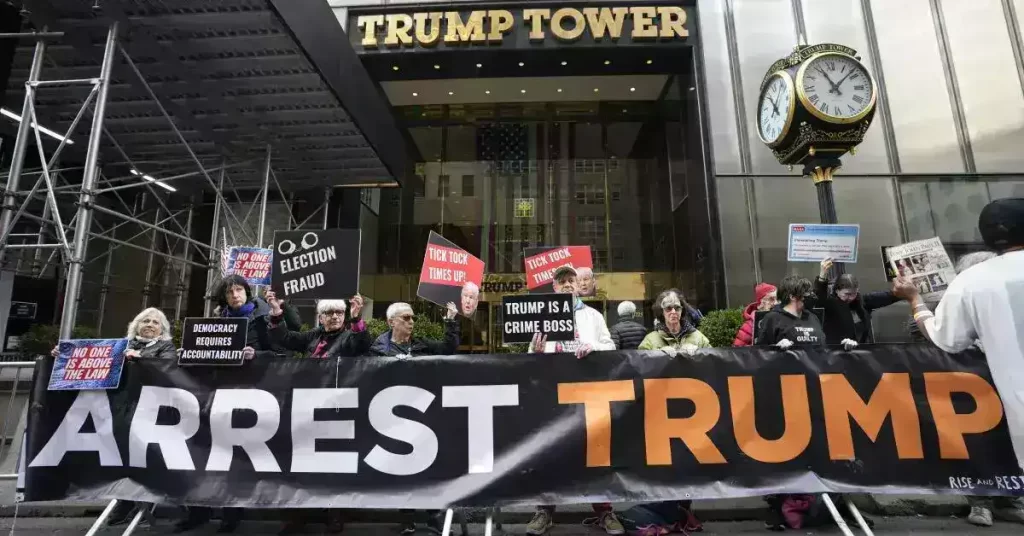Republican Lawmakers Divided over Trump’s Arrest and Charges for Election Interference
In an unprecedented turn of events, former President Donald Trump has been arrested and charged with offenses related to his alleged efforts to overturn the results of the 2020 presidential election. These charges have ignited strong reactions among Republican lawmakers, showcasing divisions within the party. House Speaker Kevin McCarthy‘s response to the charges has drawn attention, as he draws comparisons between Donald Trump‘s situation and past instances involving Democratic leaders’ questioning of election legitimacy.
Addressing the media just hours before Trump’s arraignment, McCarthy sought to draw parallels between Trump’s claims of election fraud and previous instances of Democratic leaders expressing doubts about election outcomes. McCarthy specifically mentioned Hillary Clinton’s remarks following her 2016 defeat and assertions made by Democratic members regarding George W. Bush’s victory over Al Gore in 2000.
However, legal experts and political analysts have pointed out that McCarthy’s comparisons are problematic. While Clinton and other Democrats may have questioned the legitimacy of elections they lost, there is a significant distinction between mere criticism and the alleged actions Trump took to subvert the 2020 election results. The indictment against Trump alleges that he knowingly propagated false claims of election fraud, using them as a basis to pressure state legislatures and officials to overturn the results.
McCarthy’s statements also diverge from his previous stance on Trump’s involvement in the January 6th attack on the Capitol. In the aftermath of the attack, McCarthy had acknowledged Trump’s role in fanning the flames of unrest and had called on him to ensure a smooth transition of power to President-Elect Joe Biden. At the time, McCarthy emphasized the importance of accepting election results and acknowledging Biden’s victory.
Interestingly, the indictment against Donald Trump also cites a conversation between him and McCarthy during the Capitol attack. Trump allegedly told McCarthy that the crowd was angrier than McCarthy himself, highlighting the former president’s role in perpetuating the unrest.
Joan Meyer, a legal expert, stressed that the indictment reveals Trump’s repeated disregard for information from various government officials, both at state and federal levels, who informed him that his claims were false. Despite this, Trump persisted in making those false statements, potentially contributing to the events that unfolded.
Legal scholars have pointed out the glaring differences between Trump’s actions and the examples McCarthy cited. While Trump’s right to express his opinions is acknowledged, the indictment alleges that he went beyond that by actively using deceitful means to manipulate the electoral process, undermining the democratic foundation of the United States.
The indictment outlines various instances where Trump allegedly attempted to obstruct the certification of electoral votes, including pressuring then-Vice President Mike Pence to reject valid electoral votes. Additionally, Trump is accused of orchestrating a scheme involving fake electors to delegitimize Joe Biden’s victory.
Marc Scholl, a former criminal prosecutor, underscored the distinction between expressing an opinion and conspiring to break the law. He noted that Trump’s actions crossed the line by attempting to manipulate the democratic process for personal gain.
While some Republicans, like McCarthy, have expressed discontent with Trump’s charges, others within the party have been critical of such reactions. Former Rep. Adam Kinzinger, who now serves as a senior political commentator, labeled McCarthy’s comparisons as “complete garbage,” emphasizing the disparity between the situations. Kinzinger highlighted the inability of McCarthy’s argument to hold weight even among the party’s base.
Finally, the arrest and charges against Donald Trump have ignited a firestorm within the Republican Party. McCarthy’s attempts to draw parallels between Trump’s actions and past instances involving Democratic leaders’ election-related comments have been met with skepticism and criticism from legal experts and fellow Republicans alike. The indictment against Trump portrays a pattern of deceitful behavior aimed at overturning the 2020 election results, ultimately emphasizing the importance of upholding democratic principles and the rule of law.



